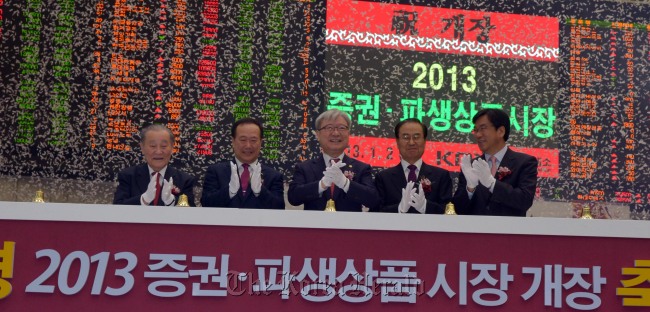A resolution to the drawn-out fiscal cliff negotiations in the United States will lift the fog of uncertainty currently hanging over the global economy and bodes well for the future of the South Korean economy, which greatly depends on overseas demand for growth, experts said Wednesday.
The fiscal cliff is a self-imposed massive automatic increase in taxes and drastic spending cuts to prevent deadlock between the two parties and encourage a compromise in reducing the fiscal deficit.
There have been worries that a failure to cut a deal might propel the U.S. economy back into a recession and it could have a negative impact on the export-driven Korean economy by dampening demand from overseas markets.
 |
Financial Services Commission chief Kim Seok-dong (center), along with the heads of stock-related organizations, celebrates the opening of the nation’s stock market for 2013 during an annual event at the Korea Exchange in Seoul on Wednesday. (Kim Myung-sub/The Korea Herald) |
The Korea Institute for International Economic Policy, a state-run think tank, earlier forecast that a failure to reach a deal on the fiscal deficit negotiations could result in cutting South Korea’s exports by 0.03 percent and lowering its gross domestic product by 1.1 percentage points. (Yonhap News)
“The agreement over the fiscal cliff negotiations is expected to lift a significant part of uncertainty over the U.S. economy,” said Lee Seung-woo, an analyst at KDB Daewoo Securities Co. “It also raises the chances that the U.S. economy will be able to achieve a growth in the lower 2 percent range this year, which is better than last year.”
South Korea’s financial markets responded positively to the news that the U.S. Congress managed to avert going over the fiscal cliff.
South Korean stocks finished 1.71 percent higher Wednesday, the first trading day of the year, due to the rising optimism following the settlement of the U.S. fiscal cliff issue, analysts said. The local currency soared to a 15-month high against the U.S. dollar.
The benchmark Korea Composite Stock Price Index shot up 34.05 points to 2031.10. Trading volume was moderate at 359 million shares worth 4.39 trillion won ($4.13 billion) with gainers leading losers 543 to 275.
Though concerns are eased, some still cautioned that the agreement to avert the fiscal cliff might also have a downside as the tax hikes included in the agreement could result in discouraging U.S consumers from opening their wallets.
“Given that consumption was driven mostly by high income earners during the financial crisis, which hit hard the middle-class people, the tax hike might put a burden on them and cause a temporary slowdown in the overall spending cycle,” said Park Sang-hyun, an economist at Hi Investment & Securities.
Talks over whether to raise the debt ceiling in the U.S. might be another uncertainty dogging global markets after its national debt reached the legal limit of $16.4 trillion late last year. A failure to raise the ceiling could catapult the U.S. economy into default and result in credit downgrades.
Recently, the U.S. Treasury Department temporarily extended the deadline until February but the outlook for the talks are not bright as Republicans remain adamant against raising the debt ceiling without implementing government spending cuts.
Beside the risks from the U.S. economy, South Korea is still facing many other uncertainties and toughening market conditions like the prolonged eurozone debt crisis, experts say. The reason behind the government’s earlier move to lower its growth estimate for this year from 4 percent to 3 percent was also due to external market conditions being worse than expected. (Yonhap News)








